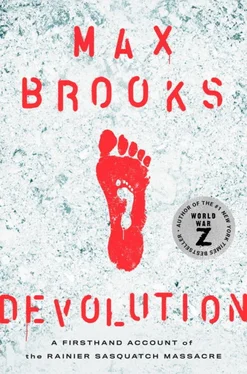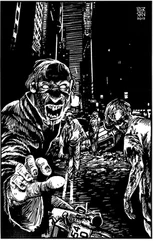He nods to the weapons around us.
…there’re only two legitimate reasons. Once you take out the toys and treason, the man-boys who want to play real life Call of Duty and the domestic terrorists watching for “black helicopters,” you’re only left with hunting and home defense.
Reasonable, practical, and completely incompatible with life in Greenloop.
When it comes to hunting… well… I can’t judge who I used to be. Like my former neighbors up there, I somehow thought I was superior to deer shooters because I chose fish over meat, and chose Apple Pay over bullets.
And as far as protecting my house… our houses, from a break-in… who’s gonna do that? And how? Greenloop is completely off the beaten track, the ultimate cu-de-sac, with a gated private road, and alarms to both private security and county cops.
So, unless you’re pulling off a Mission Impossible airlift, or you’re some hermit meth head who can’t believe his luck, Greenloop was probably the safest place in America. That was one of Tony’s selling points. That’s why none of the houses have surveillance cameras. Or dogs. Did you notice that? No dogs? The HOA guidelines forbid them. I remember thinking how strange that was when I first moved in. I mean, wouldn’t it make sense for those people to be the ultimate dog lovers? Problem is, they might scare away the wildlife, which, again, is another reason we all moved up there.
It all goes back to the core philosophy of Greenloop: People are the problem. Nature is your friend.
Chapter 13

At midnight, Bauman was awakened by some noise, and sat up in his blankets. As he did so his nostrils were struck by a strong, wild-beast odor, and he caught the loom of a great body in the darkness at the mouth of the lean-to. Grasping his rifle, he fired at the vague, threatening shadow, but must have missed, for immediately afterwards he heard the smashing of the underwood as the thing, whatever it was, rushed off into the impenetrable blackness of the forest and the night.
—PRESIDENT THEODORE ROOSEVELT,
The Wilderness Hunter
From my interview with Senior Ranger Josephine Schell.
Dr. Reinhardt was right. He didn’t know jack about primates. All apes practice some kind of faunivory, which is a fancy way of saying they eat other animals. Apes have all the biological hardware to be predators. Canine teeth for gripping and ripping flesh. Forward-facing eyes for locking on a moving target. And a brain designed to outthink food trying to get away. I heard a theory once that if aliens ever do come calling, they may very well be hostile, because the same brains that mastered spaceflight learned to think by hunting.
Different primates have different preferences, of course, with gorillas and orangutans tilting sharply toward the fruit and veggie side. That’s why they have such big bellies. Their guts are packed with plant matter, which takes a long time to break down. That’s not how eyewitnesses describe Sasquatch. What they do describe, consistently, is an omnivorous diet.
Fish seems to be their main source of protein. One story has them stealing drying fish from a cabin, another where they were digging for clams. And the guy in that movie who took the lie detector test. He says it grabbed his fishing net. With all the rivers we have here, all the salmon and trout, they probably had more than enough fuel for those gigantic bodies of theirs. Until Rainier’s eruption drove them from their traditional fishing spots. Throw in the bad berry harvest and you’ve got a biological imperative to adapt.
She refers back to the map, specifically the spots where dead deer were found.
You know that old saying, “If you can’t be with the one you love, love the one you’re with?” In the animal world, it’s called “prey switching,” where a predator ends up developing a preference for a certain food source simply because it’s more abundant than their traditional prey.
I think that’s what happened with the deer we found and it must have just happened or else we would have been finding these bone fragments for centuries. Rainier must have been their ecological tipping point, which has to make you wonder what was ours.
You know that’s how we got started, right? We were the first apes to start cracking bones. Way back in Africa, when the first skittish little scavengers climbed out of the trees. Using rocks to get at the marrow, realizing what a caloric jackpot meat was. A lot less energy to convert animal into animal than vegetable into animal. And the brain boost we got from that bonanza. Tools, language, cooperation. You can see the incentive for all the advances that make us human. More meat. Bigger brains. Bigger brains. More meat. I wonder what it looked like, when we first tasted fresh blood. What did we think? What did we feel? That moment when everything changed. From scavenger to predator. Hunted to hunter.
JOURNAL ENTRY #12 [CONT.]
The knocking interrupted Reinhardt.
It was clear and consistent, so much so that I think a few of us thought it might be mechanical. A loose pipe or maybe, just for a second, an approaching vehicle. But as we all quieted down to listen, I could definitely make out the undertone of animal grunts.
Carmen stated the obvious. “Do you hear that? It’s them.”
thock-thock-thock
I couldn’t see anything. Nobody could. They must have been farther away. Among the trees or on the other side of the ridge.
Effie asked, “What do you think it means?”
No one answered at first. Not even Reinhardt.
The more we listened, the more we could make out a single source. A branch against a trunk? I’m not sure if the grunts were meant for us. Something about them; soft, low, chaotic, like they didn’t want their voices to drown out the knocks. That’s, at least, what I think now. I didn’t have a clue at the time.
I glanced at Dan, who was equally perplexed, and then at Mostar, who seemed to be waiting for something. For the knocking to end, or change? I didn’t ask.
“That’s communication!” Vincent surprised me. I would have expected it from Reinhardt. I looked over at him, the gasbag prof, who was, amazingly, yielding the floor.
Vincent stepped out of the circle, head craned toward the trees. “They’re trying to talk to us!”
“They’re friendly,” said Reinhardt, who, I think, was trying to get a jump on the next possible conclusion. “They must be! Communication implies intelligence, which implies an innate desire for peace.”
Is that true?
The Boothes seemed to believe it, or wanted to, along with Carmen and Effie. But Palomino, she kept her eyes locked on Mostar’s dubious face.
“Maybe we should…,” she started to say, but Vincent cut her off with, “Hello! Hello there! Friends! We’re friends!”
Bobbi let go of his hand and lightly slapped him on the shoulder. “They don’t speak English!” she scolded playfully, to which Reinhardt yelled out, “Bonsoir, mes amis!” The Boothes and the Perkins-Forsters laughed. Vincent, grinning from ear to ear, snatched Mostar’s bamboo spike.
“Everyone, shhh,” he whispered, smacking it against the wall of the Common House. Three hits, then paused.
The knocking stopped. We all froze. The grunts grew louder. Vincent beamed. The knocking resumed, faster this time, louder.
THOCKTHOCKTHOCKTHOCK
“Okay, yes, yes!” Vincent whispered to us and banged back faster with his pole. I heard him whisper “Friends, friends, friends” as he hammered the Common House wall. After a dozen rapid strikes, he stopped. They responded in kind.
Читать дальше






![Traudl Junge - Hitler's Last Secretary - A Firsthand Account of Life with Hitler [aka Until the Final Hour]](/books/416681/traudl-junge-hitler-s-last-secretary-a-firsthand-thumb.webp)






